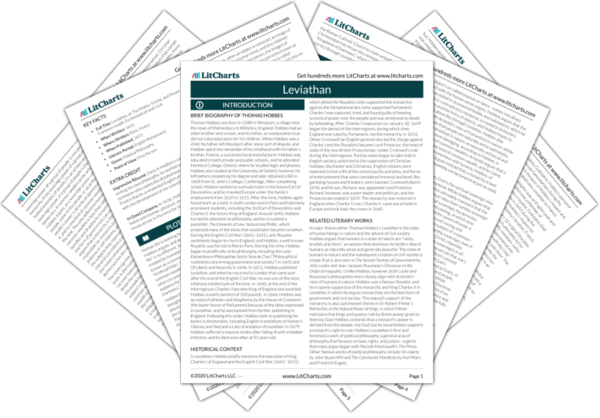Leviathan, a sea monster from the biblical Book of Job that is usually depicted as giant crocodile, is used within Christianity as a metaphor for the power of people united as one. In Thomas Hobbes’s philosophical discourse by the same name, Leviathan is symbolic of the ideal common-wealth. Hobbes mentions Leviathan several times in his book and likens the beast to the “Artificial man” that is “the great LEVIATHAN called a COMMON-WEALTH, or STATE.” This analogy is exactly how Hobbes sees the ideal common-wealth: many people united under a single sovereign power, who are stronger together than they could ever be alone. On the original cover of Hobbes’s book, Leviathan is depicted as a giant man whose body is made up of all the individual subjects of the common-wealth.
According to Hobbes, God made the “great power of Leviathan,” named him “King of the Proud” and said: “There is nothing on earth, to be compared with him. He is made so as not to be afraid. Hee seeth every high thing below him; and is King of all the children of pride.” As Hobbes argues that a fear of violence and of God drove humankind to create the common-wealth, it is particularly noteworthy that God made Leviathan not to be afraid. As the sovereign power of a common-wealth is unmatched and gathers all its power from its subjects, Leviathan is an apt symbol for a common-wealth’s strength, as there is nothing on Earth that can be rightly compared to Leviathan.
Leviathan Quotes in Leviathan
To describe the Nature of the Artificiall man, I will consider
First, the Matter thereof, and the Artificer; both
which is Man.
Secondly, How, and by what Covenants it is
made; what are the Rights and just Power or
Authority of a Soveraigne; and what it is that
preserveth and dissolveth it.
Thirdly, what is a Christian Common-wealth.
Lastly, what is the Kingdome of Darkness.
The skill of making, and maintaining Common-wealths, consisteth in certain Rules, as doth Arithmetique and Geometry; not (as Tennis-play) on Practise onely: which Rules, neither poor men have the leisure, nor men that have had the leisure, have hitherto had the curiosity, or the method to find out.

















